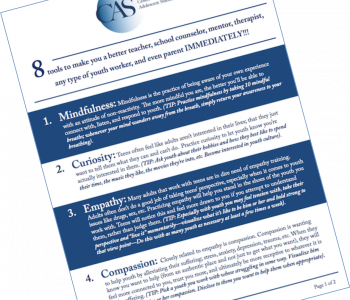

Catharine Hannay, MA
Catharine Hannay is the founder of MindfulTeachers.org and the author of Being You: A Girl’s Guide to Mindfulness, a workbook for teen girls on mindfulness, compassion, and self-acceptance.
A Dozen Quotations for Teaching Mindfulness to Teens
Here are a variety of quotations you can use in teaching adolescents about mindfulness meditation and present-moment awareness. Scroll to the end of the post for suggested discussion questions.
Defining Mindfulness
- “Paying attention, in a particular way: on purpose, in the present moment, and nonjudgmentally.”
Dr. Jon Kabat-Zinn, Wherever You Go, There You Are:
- “Mindfulness is paying attention here and now, with kindness and curiosity, so that we can change our behavior.”
Dr. Amy Saltzman, A Still Quiet Place for Teens
- “I view the practice of mindfulness as the ability to be present and de-identified with thoughts, emotions, and sensations.”
Dr. Sam Himelstein, A Mindfulness-Based Approach to Working with High-Risk Adolescents
- “For me personally, mindfulness practice boils down to two things: first, the art of joyful living—learning to enjoy my life more deeply, more fully—second, the art of handling stress[…] so that I don’t get overwhelmed.”
Dr. Dzung Vo, The Mindful Teen
- “Essentially, mindfulness means wakefulness—fully present wakefulness […] paying attention to all the details of your life. […] The object or focus of mindfulness can be anything that brings us back to right where we are. If we’re out walking, the object of meditation could be the motion of our legs and feet. If we’re washing dishes, it could be our hands. We can bring mindfulness to anything—opening a door, washing our hair, making the bed.”
Pema Chodron, Living Beautifully with Uncertainty and Change
- “A useful metaphor for mindfulness is going into a darkened room and gradually turning up a dimmer switch so that the light reveals more and more of what is in the room.”
Paul Gilbert and Choden, Mindful Compassion
The Benefits of Presence and Awareness
- “I was a bit disappointed to discover that meditation wasn’t as exotic as I’d expected. […] Feel my breath!? […] But I soon found out just how life-changing it would be simply to focus my attention on inhaling and exhaling in order to connect fully with my experience in a whole new way, one that allowed me to be kinder to myself and more open to others.”
Sharon Salzberg, Real Happiness: The Power of Meditation
- “When it is hot, we go racing for the air-conditioning. When it is cold, we go racing for the heater. When we are happy, we worry that it won’t last. When we are sad, grieving, and miserable, we seek any kind of relief or distraction. […] We must not resist the present moment, whatever it is. Accept it. If you are grieving, weep until the tears are gone. Be hot, be cold, and know the moment will pass.”
Marc Lesser, Know Yourself, Forget Yourself, p .190
- “I kept at it 20 minutes a day, first grimly, then with growing curiosity. Because despite the chaos, I could feel meditation turning into a haven. My thoughts were all over the place—but they were always all over the place. Meditation let me watch them zing around without doing anything about them. I could just relax into being the way nature made me.”
“The Transcendent Moment Martha Beck Had After 20 Years of Meditation,” Oprah Magazine
- “My wireless connection to the internet had suddenly stopped working. […] So I put all my deep technological know-how to work: I yelled at it. No change. So I yelled at it some more. When that didn’t work, I unplugged everything and waited one minute. While everything was unplugged, I had nothing to do, so I just sat there. It’s strange, because one minute is so little, but when the time was up, I felt noticeably different.”
Peter Bregman, “Restore Yourself to Factory Default Settings,” Harvard Business Review
11.”It may be different for others, but pain is what it took to teach me to pay attention. In times of pain, when the future is too terrifying to contemplate and the past too painful to remember, I have learned to pay attention to right now. […] Each moment, taken alone, is always bearable.”
Julia Cameron, The Artist’s Way, p. 54
- “I like to tell my students the story of a man who went to a mindfulness retreat because his therapist said he’d feel better if he learned to meditate. The retreat turned out to be a real roller coaster. Yes, there were moments of calm, but he also plunged deeply into fear, anger, and grief. The next time he saw his therapist, he told him he’d suffered horribly. ‘How could you have promised I’d feel better?’ Nodding sagely, the therapist replied, ‘You are feeling better… You’re feeling your fear better, feeling your anger better, feeling your grief better.”
Tara Brach, Radical Compassion, p. 23
Suggested Discussion Questions
- Which of these quotations did you like the most (or the least)? Why?
- How would you explain ‘mindfulness’ to a friend?
- When do you feel most ‘mindful’? When do you feel least ‘mindful’?
- Why do you think it’s so hard to stay present in today’s society?
- How could you bring more mindfulness into your daily life? How do you think this would benefit you?
Join the FREE Resilience Community for Helping Professionals to learn more about mindfulness, trauma-informed care, resilience, building relationships, and more! Our community features self-paced courses, a monthly live Zoom call, a weekly live meditation, and an online platform to connect with other providers/professionals in your field.
Related Posts
A Dozen Songs for Teaching Mindfulness to Teens
A Dozen Videos for Teaching Mindfulness to Teens
Three Dangerous Misunderstandings About Mindfulness
Ten Essential Guidelines for Teaching Meditation to Trauma-Impacted Youth

